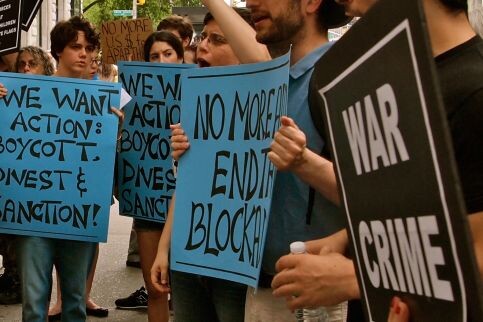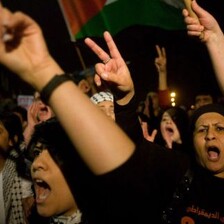The Electronic Intifada 24 August 2010

New York City activists have kept the pressure on settlement financier Lev Leviev. (Flickr)
This week, the Norwegian government announced that it has divested from two major Israeli companies involved in settlement construction and land theft in the occupied West Bank. Both companies, Africa Israel Investments and its subsidiary, Danya Cebus, are owned by Israeli billionaire Lev Leviev, and have been at the center of a widespread boycott, divestment and sanctions campaign since 2009.
Along with solidarity groups, Palestinians from the villages of Bilin and Jayyous — where land has been confiscated for ongoing settlement construction by another Leviev-owned company — steadily pressured the Norwegian government to divest from the two Israeli companies.
In a press release from Adalah-NY, the solidarity group that has been instrumental in organizing boycott campaigns against Leviev companies, Sharif Omar of the Palestinian village of Jayyous’ Land Defense Committee stated: “we welcome this decision by the Norwegian government to divest from some of Leviev’s companies. But another Leviev company, Leader Management and Development, continues today to build settlements on Jayyous’ land. We call for additional international action to pressure these companies and the Israeli government to end construction and return our stolen farmland.”
The Norwegian government’s landmark decision comes as the global boycott, divestment and sanctions movement is gaining ground. In recent months, internationally-renowned musicians, including Elvis Costello, Gil Scott-Heron and Carlos Santana, have canceled their scheduled shows in Israel in protest of the state’s ongoing violations of human rights and international law. Last month a food co-operative in Olympia, Washington, became the first US grocery store to refuse to shelve Israeli products.
Earlier this month, Irish artists signed onto a broad-based boycott initiative, pledging to refuse to perform or exhibit their work in Israel and to refuse to accept donations or grant funding from Israeli institutions, becoming participants in the first nation-wide cultural boycott campaign.
Localized direct actions related to the global boycott movement are making an impact as well.
Chicago activist arrested
In a demonstration organized by the Palestine Solidarity Group-Chicago on 23 August, more than two dozen activists converged on downtown Millennium Park to call on city leaders to sever ties with Israel and drop Petach Tikva, Israel from the Chicago Sister Cities program. During the annual Chicago Sister Cities’ International Festival, protesters rallied outside — and later, inside — the venue. One activist was arrested and released later that day.
“Petach Tikva — an officially segregated city, the first Jewish-only settlement in historic Palestine and the site of the primary detention center where Israeli forces abuse and torture Palestinian political prisoners — has been dubbed by rights group Amnesty International as ‘Israel’s Guantanamo,’” PSG stated in a press release (“Chicago arrested calling for boycott of Israel’s Guantanamo,” 23 August 2010).
“Upholding the Palestinian call for boycott, divestment and sanctions measures on apartheid Israel, PSG and its allies object to business-as-usual with Israel. Under the false premise of promoting culture and education, Petach Tikva’s inclusion in Chicago Sister Cities promotes Israel-US business ties while it whitewashes Israel’s occupation and human rights abuses,” the statement added.
During the protest activists entered the festival venue and chanted “Drop Petach Tikva!” Activists reported that a pianist who was performing in the hall at the time “stood at attention out of respect once he heard the protesters’ message.”
“The PSG and allies were compelled to bring the message directly into the festival because for the last year and a half, the Chicago Sister Cities International has refused to meet with PSG and members of the community to hear about Petach Tikva’s special role in Israel’s oppression of the Palestinian people,” PSG stated.
The group said it plans to keep up the pressure on city officials until the Chicago’s Sister Cities program drops its partnership with Petach Tikva.
Charges dropped against British activists
In related news, four British activists were recently acquitted of all charges related to their direct action protests against the Israeli cosmetics company Ahava. On 10 August, a British court ruled the activists not guilty of “aggravated trespass” for their involvement in two separate actions inside an Ahava store in London’s Covent Gardens neighborhood in September and December 2009.
In the actions, the four campaigners rolled barrels inside an Ahava beauty products store, locked themselves inside and forced the store to close “while police came to cut open the barrels and arrest the activists,” as reported by the International Middle East Media Center (“Four British Activists Acquitted In Anti-Ahava Action,” 22 August 2010).
All cosmetics on sale at the Ahava store originate from Mitzpe Shalem, an Israeli settlement colony in the occupied West Bank. IMEMC added that Ahava’s products are also unlawfully labeled “made in Israel” despite being manufactured in the settlement. The products are also made with Palestinian natural resources without the permission of, or compensation for, Palestinians on whose land the settlements occupy.
Using the court ruling as a precedent, activists say that they intend to continue the campaign against Ahava. Speaking to the International Solidarity Movement, the acquitted activists said that they will “continue to challenge corporate complicity in the occupation and Israel’s impunity on the international stage” (“,” 11 August 2010).
One of the campaigners added: “The message is clear. If your company is involved in apartheid and war crimes and occupying Palestinian land, people will occupy your shop.”
Additionally, in Ireland this week, the Ireland Palestine Solidarity Campaign (IPSC) announced they will stage a demonstration to protest the Ireland-Israel match during a FIFA Women’s World Cup Qualifier on 25 August.
“In line with the wishes of Palestinian civil society, the protest will call for a sporting boycott of Israel due to the racist and apartheid nature of the Israeli state,” IPSC stated in a press release (“Protest at Ireland v Israel women’s football match …”). “This is in support of the Palestinian Campaign for the Academic and Cultural Boycott of Israel (PACBI) who have confirmed this match falls under their boycott, divestment and sanctions (BDS) guidelines.”
Organizers say the theme of the protest will be “Love Football, Hate Apartheid.” IPSC national chairwoman Freda Hughes said: “While some may suggest that sports and politics shouldn’t mix, we believe there is no place in sport for racism or teams who act as ambassadors for racist or apartheid states.”

